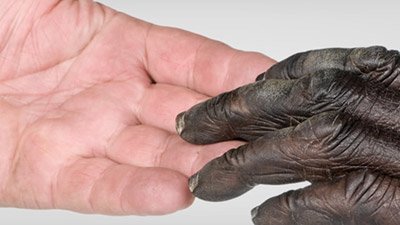
Easy-Going Ape Joins Genome Club
Easy-going ape joins the genome club.
News Source
- Associated Press: “Scientists map DNA of bonobo, our peaceful ape kin”
The bonobo, an endangered species native only to the region south of the Congo River in central Africa, is the last great ape to get its genome sequenced. Comparison with chimpanzee and human genomes reveals the bonobo genome is “98.7% identical to corresponding sequences in the human genome.”1
Kay Prüfer of the Max Planck Institute for Evolutionary Anthropology in Leipzig, Germany, led the sequencing study. Prüfer’s team found the human genome has just as much in common with the bonobo as with the chimp. "Humans are a little like a mosaic of bonobo and chimpanzee genomes," says Prüfer. The bonobo and chimp share an even higher percentage of DNA, 99.6%. The researchers feel this information should help us understand more about the last common ancestor of all three. They write, “That ancestor may in fact have possessed a mosaic of features, including those now seen in bonobo, chimpanzee and human.”2
Chimps and bonobos likely “speciated” from a common ancestor, and there is nothing about that process that supports ape-to-human evolution.
Prüfer says humans and chimps diverged from their common ancestor 6 million years ago, but chimps and bonobos did not diverge until a million years ago after being geographically isolated by the formation of the Congo River. They eventually formed separate species, though they do resemble each other. Speciation, as we frequently point out, is observable in nature, does not require millions of years to occur, and does not involve evolution into new kinds of animals. Speciation is often associated with such geographic isolation as would have occurred when various members of the ape kind arrived in Africa after disembarking from the Ark, In other words, chimps and bonobos likely “speciated” from a common ancestor, and there is nothing about that process that supports ape-to-human evolution.
The apes’ behaviors differ greatly from each other, but the researchers note each species has much in common with humans, genetically and behaviorally. Chimps, for all their cute movie roles, are well suited for the more aggressive roles in which some filmmakers cast them. Chimps can be fairly aggressive, even quite violent. They also are competitive and have a male-dominated hierarchy. Chimps, unlike bonobos, can use tools and have “bigger, better brains.” Bonobo males, on the other hand, “do not compete intensely for dominant rank” and are often subordinate to females.3 They “make love, not war” and may bite but never kill. Bonobo society is a non-violent and playful world of sharing. Bonobos are even nicknamed “hippie chimps.”4 Geographically isolated from gorillas and chimps, bonobos may have been able to survive with their non-violent behavior because they faced little competition for resources. Chimp and gorilla habitats overlap in the wild, possibly prompting selection for their more aggressive natures.
While the researchers are confident that the behavioral differences will be explainable genetically, they have not yet investigated those questions. However, believing that humans are equally related to each of these apes, some scientists hope this sort of information will explain how the ugly side of human nature evolved. Brian Hare, who heads the Hominid Psychology Research Group at Duke University, comments, “Is the bonobo genome the secret to the biology of peace? They have done something in their evolution that even humans can’t do. They don’t have the dark side we do. If we only studied chimps, we’d get a skewed view of human evolution.”
Commenting on the apparent similarity between bonobos and humans, molecular geneticist and creationist Dr. Georgia Purdom says, “Just as with the chimp genome, we see numbers reported of over 98% similarity between the bonobo and human genomes. This shouldn’t be surprising when you understand how the bonobo genome was sequenced. The scientists used human and chimp genomes as a template or scaffold to assemble the bonobo genome because of the supposed common ancestry shared by them. This type of sequencing is very biased and leads to inflated amounts of similarity.” For more information about the way evolutionary bias affects the technology used to sequence and compare genomes, see “How Genomes are Sequenced and Why it Matters: Implications for Studies in Comparative Genomics of Humans and Chimpanzees” and “Genome-Wide DNA Alignment Similarity (Identity) for 40,000 Chimpanzee DNA Sequences Queried against the Human Genome is 86–89%.”
God created Adam and Eve on Day Six of Creation Week. He made them the same day He created land animals, including apes. By God’s eyewitness account, therefore, humans and apes do not share a common ancestor. Speculation about origins is always influenced by worldview-based presuppositions. Those who reject the possibility of a Creator must create untestable scenarios built on speculation about the way genomes of ape-like ancestors could mutate enough to become human. Read more about this topic in today’s feature on the “Six secrets of you”!
Finally, the origin of humanity’s “dark side” requires we look no further than Genesis chapter 3. When Eve responded to Satan’s question, “Yea, hath God said?” by doubting God’s Word, when Adam and Eve rebelled against the Creator—humans acquired a sinful nature, a “dark nature” God never intended for us to have. Our problem is sin, not our evolutionary past. The answer to our sin problem is not found in the genetics lab but in the Cross of Jesus Christ.
Further Reading
- How Genomes are Sequenced and Why it Matters: Implications for Studies in Comparative Genomics of Humans and Chimpanzees
- Genome-Wide DNA Alignment Similarity (Identity) for 40,000 Chimpanzee DNA Sequences Queried against the Human Genome is 86–89%
- Are Humans and Chimps Related?
- If Human and Chimp DNA Are So Similar, Why Are There So Many Physical and Mental Differences Between Them?
- Chimp Genome Sequence Very Different from Man
- Scientists Admit Genetic Data Timing Uncertain
For More Information: Get Answers
Remember, if you see a news story that might merit some attention, let us know about it! (Note: if the story originates from the Associated Press, FOX News, MSNBC, the New York Times, or another major national media outlet, we will most likely have already heard about it.) And thanks to all of our readers who have submitted great news tips to us. If you didn’t catch all the latest News to Know, why not take a look to see what you’ve missed?
(Please note that links will take you directly to the source. Answers in Genesis is not responsible for content on the websites to which we refer. For more information, please see our Privacy Policy.)
Footnotes
- http://www.nature.com/nature/journal/vaop/ncurrent/full/nature11128.html
- http://www.nature.com/nature/journal/vaop/ncurrent/full/nature11128.html
- http://www.nature.com/nature/journal/vaop/ncurrent/full/nature11128.html
- http://www.voanews.com/content/scientists-unravel-hippie-chimp-genome/1210663.html
Recommended Resources

Answers in Genesis is an apologetics ministry, dedicated to helping Christians defend their faith and proclaim the good news of Jesus Christ.
- Customer Service 800.778.3390
- © 2024 Answers in Genesis



